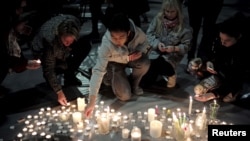Eight drug convicts were executed by an Indonesian firing squad early Wednesday, but a Filipina who was on death row with them was unexpectedly spared, local media reports said.
The Filipina's execution was delayed at the last minute after one of her recruiters surrendered to police in the Philippines, the attorney general's spokesman said.
"The execution of Mary Jane [Veloso] has been postponed because there was a request from the Philippine president related to a perpetrator suspected of human trafficking who surrendered herself in the Philippines," said spokesman Tony Spontana. "Mary Jane has been asked to testify."
Jakarta moved forward with the other executions despite intense opposition abroad from those who said the punishment would be too harsh.
The convicts had been held at Nusa Kambangan jail, an island prison off Java. They included two Australian members of the so-called “Bali nine” heroin trafficking ring, Andrew Chan and Myuran Sukumaran; Indonesian citizen Zainal Abidin; and Brazilian national Rodrigo Gularte.
Despite sustained appeals from the international community, rock bands and global leaders, Indonesian President Joko Widodo, known as Jokowi, steadfastly refused to grant clemency for narcotics-related offenses.
The president described the executions as the necessary “shock therapy” required to counter what he called Indonesia’s “drug emergency."
The president has said that 40 to 50 people die in Indonesia each day because of drugs — a statistic that has been widely questioned by academics and human rights activists, such as Daniel Awigla, from a coalition of Indonesian groups against the death penalty.
Awigla said the president has leaned too heavily on projections from the National Narcotics Agency and ignored alternative views.
“It is very dangerous, the state using this questionable data to ensure, to be the justification to have capital punishment. It has become very dangerous data, it is very systematic and why doesn't Jokowi listen to other voices?" Awigla asked.
In recent weeks other serious allegations have emerged about flawed legal processes.
Severity of punishment questioned
A lawyer for the Bali nine pair has told of how the judges initially agreed to accept bribes of more than $100,000 for a lenient sentence.
In the trial of Indonesian Abidin, one witness was allegedly tortured, while lawyers for Veloso insist she was a victim of human trafficking who went to trial without a qualified translator.
The family of Brazilian Gularte has for years been pushing for a reprieve on the basis of his fragile mental health. Specialists have consistently diagnosed him as paranoid schizophrenic.
Others argued that in accordance with international law, capital punishment should be limited to the “most serious of crimes.” The U.N. Human Rights Committee has concluded that capital punishment for drug offenses fails to meet this condition, said Andreas Harsono, from Human Rights Watch.
"There are a lot of studies. The U.N. office for drugs and crime already says that the death penalty should not be implemented against drug traffickers, only for serious crimes which result in direct death," Harsono said.
After months of intense lobbying and last-ditch legal appeals, the families of those on death row said their final goodbyes Tuesday.
Candlelight vigils were held across Australia, where the public and the government strongly pushed for Indonesia to halt the executions.
But in Indonesia, where many support the use of capital punishment, political analyst Yohanes Sulaiman said the executions would most likely boost the president’s popularity.
"I mean, if you think about it, there will be people applauding him domestically. I mean, people saying, ‘You know, he is standing against all the international positions [and] he is not afraid to be pushed around.' So there will be a short-term euphoria, basically,' " Sulaiman said.
Indonesia has some of the strictest drug laws in the world and ended a four-year unofficial moratorium on capital punishment in 2013.
Some information for this report came from Reuters.





